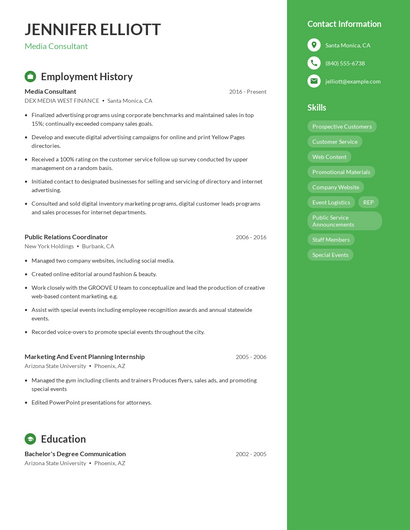
An Educational Consultant's job is very similar to that of a school counselor except that it is self-employed. Although educational consultants can be self-employed, they are also employed by schools or consulting firms. The right education and relevant experience are required to be considered for this role. Continue reading to find out more about the field and its responsibilities. This article also covers the salary, job outlook, and career path of an Educational Consultant.
Outlook on the job
An education consultant can work in many places. Many of these experts have extensive knowledge about the current education landscape. They may have done volunteer work in schools or been elected school governors. Consultants might work for companies or government agencies. They may also be self-employed. Educational consulting positions are available with international agencies and specialisation organisations. Consultants have many responsibilities.
The BLS projects that education consultants will be in demand through 2028. There is a positive outlook on the job market. The state and local budgets will determine the growth. Schools and postsecondary institutions alike will be held responsible for student achievement data, graduation rates and test scores in the coming years. Schools and districts will therefore seek out education consultants to assist with technology and curriculum issues. Although there may not be immediate job security, many in this field enjoy independence and can work when it suits them.

Salary
Education consultants can make a very high salary, but this does not mean that they will get a huge raise. Educational consultants are usually employed directly by schools and postsecondary institutions, but they can also work as freelancers or for smaller organizations. These professionals must have education-related experience, and follow a professional dress code. These professionals must have a broad knowledge base and be able to listen to clients. They must also be able to articulate their ideas and references education theory when necessary.
The salaries for educational consultants vary greatly. This is especially true if you are interested in working in a hotfield. Salary levels for consulting positions will vary depending on where you live, your experience and your reputation. High-reputation consultants can be paid high salaries. Others may earn a lower salary and are less popular. The quality of your work and your experience will affect how much you earn.
Education Required
Education in educational consulting can assist people with their transition from school to college. Consultants may help individuals apply for financial aid as well as apply to college. Consultants may be employed by a school district or college. Most educational consultants have experience teaching. If you are looking to specialize in one area of education, a master's program in educational consulting might be beneficial. They will need to be familiarized with the admissions test process, assessment, and career development.
A high school teacher can also be an educational consultant. Some consult with college-bound students or special needs students. Others are involved in whole schools and school systems. Some consultants have a high level of expertise. There are many options for educational consulting, each with its own requirements and education. Most consultants hold a bachelor’s degree. Here are the qualifications for educational consultants:

Career path
According to the Bureau of Labor Statistics (BLS), there is a growing demand for education consultants. The profession is expected to increase by six per cent over the next eight year. This growth will likely be dependent on the budgets of state and local governments. Schools and districts will be under increasing pressure to improve student achievement, test scores, and graduation rates. Schools and districts are seeking out outside assistance from educational consultants in order to implement new technology or curriculum. Although there is no immediate job security in this field, the future of education consulting looks bright for those with a passion for the field.
Three career options can be described by the title of educational consultant. Some use the term to refer to state employees or government agencies, while others refer to freelance professionals who work for private organizations. These people are also known as educators, educational planners, and educational consultants. However, the designation is often used to describe those with specific backgrounds in education. Educational consultants can be educators or specialists in one field. Here are a few tips to consider when deciding which career path to pursue.
FAQ
What is the difference of a consultant versus an advisor?
An advisor gives information on a topic. A consultant offers solutions to problems.
To help clients achieve their goals, a consultant works directly with them. Advisors advise clients indirectly via books, magazines, lectures and seminars, etc.
Are you a consultant?
Consulting is not only an entry-level profession for those looking to make fast money, but it's also an excellent way to acquire valuable skills that you can apply throughout your career.
Consulting offers various opportunities from project management, business development, strategy, training, and leadership roles. Projects could include small start-ups or large international corporations.
You can develop your skills and gain experience in a variety of industries by consulting. This could include learning how to manage teams, write proposals, manage budgets and analyze data.
Can anyone be a Consultant?
A consultant is someone who helps you achieve your goal by providing advice on how to do something better, faster, cheaper, etc.
You may need a consultant to help you with problems, make decisions or negotiate with others.
Consultants are often hired to help with specific tasks and projects.
Consultants are usually paid hourly, daily or per project.
Statistics
- According to IBISWorld, revenues in the consulting industry will exceed $261 billion in 2020. (nerdwallet.com)
- 67% of consultants start their consulting businesses after quitting their jobs, while 33% start while they're still at their jobs. (consultingsuccess.com)
- My 10 years of experience and 6-step program have helped over 20 clients boost their sales by an average of 33% in 6 months. (consultingsuccess.com)
- So, if you help your clients increase their sales by 33%, then use a word like “revolution” instead of “increase.” (consultingsuccess.com)
- According to statistics from the ONS, the UK has around 300,000 consultants, of which around 63,000 professionals work as management consultants. (consultancy.uk)
External Links
How To
What should I do to get started with a consulting business?
Start a Consulting Company to make some extra money from home. You don't need any previous business experience or investment capital. To start your own consulting business, you can build a site. You can use social media platforms like Facebook, Twitter, LinkedIn and Instagram to promote your services.
You can use these tools to put together a plan for marketing that includes:
-
Create content (blogs).
-
Contacts are essential for building relationships
-
Generating leads (lead generation forms).
-
Selling products (eCommerce websites)
Once you have created your marketing strategy you will need to find clients that will pay for it. Some prefer to meet up at networking events or go to meetings, while others prefer to use online platforms like Craigslist, Kijiji, and others. Your choice is yours.
Once you have found clients, you should discuss terms and payment options. This could include flat fee contracts, hourly fees or retainer agreements. So that you are able to communicate clearly during the entire process, it is important to understand what you expect from a client before you accept them.
Hourly agreements are the most commonly used contract type for consultancy service. This contract allows you to pay a fixed amount each week or month for certain services. Depending on the type of service you are offering, you may be able to negotiate a discount depending on the length of the contract. It is important to understand the terms of any contract you sign before you sign it.
Next, create invoices. Send them to your clients. Invoicing is one those things that seem so simple until you actually do it. There are many ways that you can invoice your clients depending on what your preferences are. Some prefer to send their invoices directly by email, while others prefer to print and mail hard copies. No matter which method you choose to use, it is important that it works for you.
After you've finished creating invoices, you'll want to collect payments. PayPal is preferred by most people because it is simple to use and offers many payment options. Other payment processors, like Square Cash or Google Wallet, Square Cash or Apple Pay, Venmo and Venmo are also available.
Once you're ready to begin collecting payments, you'll want to set up bank accounts. Separate checking and savings accounts allow you to keep track of income and expenses separately. Automated transfers into your bank account are a great way to pay bills.
While starting a consultancy company may seem daunting, once you master the basics, it becomes easy to manage. For more information on starting a consultancy business, check out our blog post here.
A consulting business is a great way of making extra money without worrying about your employees. Many consultants work remotely, which means they don't have to deal with office politics or long hours in the office. Remote employees have more flexibility because they are not bound by regular work hours.